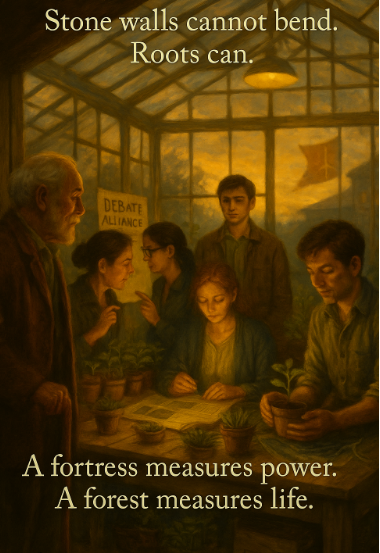
The greenhouse was no longer just a project space — it was becoming a rhythm. After classes, footsteps traced familiar paths: Priya arriving with debate notes, Leo with a bundle of wires, Sam balancing seed trays, Aisha carrying fabric scraps, Mateo sketching reinforcements. Each came not for Emil, but for the work itself — yet together, they formed a pulse.
The air inside buzzed with small sounds: scissors clipping canvas, pencils scratching diagrams, water trickling from Emil’s tin can. Aisha’s repurposed sensor blinked softly, registering soil moisture. On the workbench, Priya rehearsed a counter-argument with Sam, gesturing toward Mateo’s blueprint as if it were an exhibit in her case. Laughter occasionally burst through the hum, quick and surprising, like birds darting between branches.
Outside, the courtyard felt colder, quieter, the gold-sword banner hanging limp after days of rain. Lara’s council sessions grew longer, her language sharper: “compliance,” “output measures,” “streamlined approvals.” Yet cracks widened. Students whispered after meetings. Marco’s spreadsheets clashed with lived experience. Projects stalled, but conversations moved — toward the greenhouse.
That Thursday, when council convened, something shifted. Priya entered not with a request but a proposal packet, co-signed by Robotics, Arts Collective, and even the Science Club. She laid it on the council table without bowing her head.
“This is not a petition,” she said clearly. “It’s evidence.”
She pointed to outcomes: mentoring hours logged, student collaborations documented, photographs of kids smiling with their first moving robots. “Measured differently, but real. If this council ignores outcomes that grow communities, not just trophies, then it ignores its own roots.”
The room stirred. Even some of Lara’s allies shifted in their seats. Marco leaned toward her, whispering, but his numbers did not erase the image of sunlight beaming through glass onto a debate flyer taped to a greenhouse door.
That evening, Emil sat on a low stool, brushing soil from his palms. Grandfather appeared at the greenhouse door, his carved stick framed against the warm glow inside. His eyes swept the scene—Priya bent over charts with Leo, Sam humming as she tucked seedlings into trays, Aisha stitching fabric into banners, Mateo strengthening a joint.
“You see them?” Grandfather said softly. “Not followers. Not a faction. A forest finding its form.”
Emil’s gaze lingered on Sam cradling a seedling. “It feels… fragile still. Like a gust could scatter it.”
Grandfather stepped closer, tapping the ledger Emil had begun to fill—names, contributions, quiet acts of care. “Fragile? Look deeper. Lara builds walls. She commands stone to pile upon stone. But stone cannot breathe. Cannot bend. You grow a canopy. Seed by seed, hand by hand. You don’t command—you kindle.”
Emil’s eyes flicked toward the stiff, gilded banner hanging in the courtyard beyond the glass. “What if she strikes? Cuts funding? Bans meetings?”
“Storms break branches,” Grandfather replied, running a thumb over Priya’s name in the ledger. “Not roots. Roots don’t fight the storm. They drink its chaos. They outlast it. This”—his finger pressed the cover of the ledger—“is the map of the roots. The record of what endures. Let her strike at leaves. The forest remembers underground.”
Emil rose, lifting a tray of sunflower shoots—fragile, yet straining upward. “And if the storm is long?”
Grandfather’s smile was faint but steady. “Then the roots grow deeper. The canopy widens. And one day…” He gestured toward the auditorium where the last streak of sun gilded Lara’s emblem before twilight swallowed it. “One day, the forest’s shadow becomes the only shelter left.”

